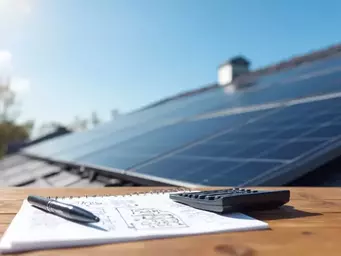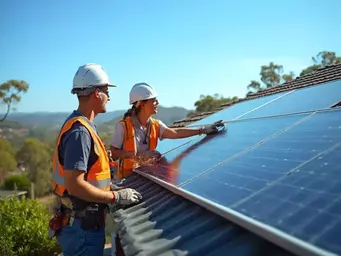Federal Solar Tax Credit
Allows deduction of installation costs from federal taxes.
26%
(until Dec 31, 2022)
22%
(for 2023)
**Phases out after 2025. Act now!
Unlock expert insights on solar panel installation, energy savings, and government rebates for Australian homes and businesses. Join our community of informed solar enthusiasts!
Posted on: 2025-10-13
By: Evelyn Tran
Are you ready to unlock the potential benefits of government solar rebates? Understanding these incentives can significantly impact your decision to transition to solar energy. Let’s dive into the crucial insights you need to grasp the world of solar rebates and what they can mean for your wallet!
Understanding government solar rebates is crucial for homeowners looking to lower upfront installation costs. These programs, offered at federal, local, and utility levels, aim to make solar energy more accessible and affordable.
Allows deduction of installation costs from federal taxes.
26%
(until Dec 31, 2022)
22%
(for 2023)
**Phases out after 2025. Act now!
Various forms of financial aid to encourage solar adoption.
Check local utility & government programs.
As a solar energy consultant, I often see homeowners confused about the various government solar rebates available to them. Understanding these rebates is crucial because they can significantly lower the upfront costs of solar panel installation. In this section, we'll explore what government solar rebates are, the key federal tax credits you should know, and local utility company incentives that can help make your transition to solar energy smoother and more affordable.
Government solar rebates and incentives are financial aids designed to encourage homeowners and businesses to invest in renewable energy solutions, particularly solar energy. These programs can take various forms, such as direct rebates, tax credits, and grants, all aimed at making solar energy more accessible.
By utilizing these rebates, you can significantly reduce the overall cost of your solar installation, thus making a more informed decision for your energy needs!
The federal government offers tax credits for solar energy installations, which can provide substantial savings for homeowners. Understanding these tax credits can help you plan your solar investment effectively.
The Federal Solar Tax Credit, also known as the Investment Tax Credit (ITC), allows you to deduct a significant percentage of your solar installation costs from your federal taxes. Currently, this credit is set at 26% for systems installed by December 31, 2022, decreasing to 22% for installations completed in 2023. It is essential to take advantage of this before it drops even lower!
The U.S. Department of the Treasury has highlighted the importance of these tax credits in promoting clean energy initiatives. This credit directly reduces the amount of federal income tax you owe, dollar for dollar, based on a percentage of the total cost of your solar energy system. The availability and percentage of this credit are subject to change, making timely action crucial for homeowners. For example, systems installed in 2022 are eligible for a 26% credit, while those installed in 2023 will receive 22%. After 2025, the residential tax credit is scheduled to expire, emphasizing the need to plan your solar installation in advance to maximize these financial benefits.
Looking ahead, if you're considering solar energy, it’s vital to be aware of the upcoming changes in 2025. The solar tax credit is set to phase out completely after this point. Therefore, getting your solar system installed before then not only maximizes your savings but also locks in these benefits before they’re gone.
In addition to federal tax credits, many local utility companies offer their own incentives for solar installations. These can further reduce your costs and enhance the value of switching to solar energy.
Utility company incentives typically come in the form of rebates for installing solar systems. These rebates are often available to both residential and commercial customers and can be a great way to offset installation costs. It's wise to check with your local utility provider to find out what specific programs they offer!
Local governments may also provide additional programs to encourage solar adoption. These programs can range from property tax exemptions to financing options that make installation more affordable. Keeping an eye on these options can help you leverage every available resource to maximize your savings. The Department of Energy provides valuable insights into understanding various solar programs and avoiding common pitfalls, ensuring you make informed decisions.
We want to hear from you! Have you considered taking advantage of government solar rebates? Share your thoughts with us:
Here are some common questions about government solar rebates and incentives:
As you embark on your solar energy journey, it’s crucial to recognize the importance of timely action. With government rebates and incentives often changing, the sooner you install your solar system, the better your chances of maximizing those benefits. By acting quickly, you can not only take advantage of current rebates but also secure your energy independence for the years to come.
Feeling uncertain about when to proceed? That’s perfectly normal! I encourage you to stay informed and ensure your decision aligns with both your financial goals and your energy needs. With the right timing, you can set yourself up for significant savings.
Being proactive about your solar installation can significantly impact your overall savings. Here are a few reasons to consider:
By understanding these factors, you can make a more informed decision about your solar investment. Remember, every month you wait could mean missing out on valuable savings!
As a seasoned solar energy consultant, I can’t stress enough how beneficial it is to seek professional guidance. At Longi Solar Solutions, we provide insights not just on installation but also on navigating the intricate world of solar rebates. By leveraging our experience, you can avoid common pitfalls and make the most of available incentives.
Here are some tips to keep in mind when seeking advice:
With expert guidance, you’ll feel more confident in your choices and secure greater savings on your investment!
Solar power installers play a vital role in ensuring you benefit from the available rebates. They not only facilitate the installation process but also help you navigate the paperwork needed for claiming those incentives. Choosing a reputable installer is key to a seamless experience.
Here’s what to look for in a solar installer:
By selecting the right installer, you’ll enhance your chances of maximizing your solar savings while enjoying a smooth transition to renewable energy.
Transitioning to solar energy is not just about installation; it’s about becoming part of a larger community dedicated to sustainability. Engaging with this community can provide you with valuable support and resources along the way.
At Longi Solar Solutions, we believe in fostering a collaborative approach to solar energy adoption. Let’s explore how you can connect with others and make your renewable energy journey even more fulfilling!
Connecting with like-minded individuals can enhance your understanding of solar energy and its benefits. Here are some ways to engage:
Being part of a community not only provides support but also opens doors to shared experiences and tips that can help you maximize your solar journey.
As you embrace solar energy, remember that you’re part of a movement towards sustainability. Small changes in your daily habits can contribute to a significant reduction in carbon footprints. Here are some sustainable practices to consider:
Every action counts! By promoting sustainable practices, you contribute to a healthier planet for future generations.
Community solar initiatives are a fantastic way for those unable to install solar panels on their homes to still benefit from solar energy. These programs allow multiple participants to share the benefits of a single solar array, making solar accessible to everyone. The National Renewable Energy Laboratory (NREL) offers detailed research on community solar models and their potential for broader adoption.
Here’s what you can look for in community solar programs:
By getting involved in community solar programs, you not only save money but also help drive the renewable energy movement forward!
Here is a quick recap of the important points discussed in the article:

 Ready to unlock the potential of solar energy for your home? Understanding the financial landscape o
Ready to unlock the potential of solar energy for your home? Understanding the financial landscape o
 As you contemplate the shift to solar energy, consider this: a comprehensive understanding of the co
As you contemplate the shift to solar energy, consider this: a comprehensive understanding of the co
 Choosing the right solar installer can significantly impact your renewable energy journey. Are you r
Choosing the right solar installer can significantly impact your renewable energy journey. Are you r